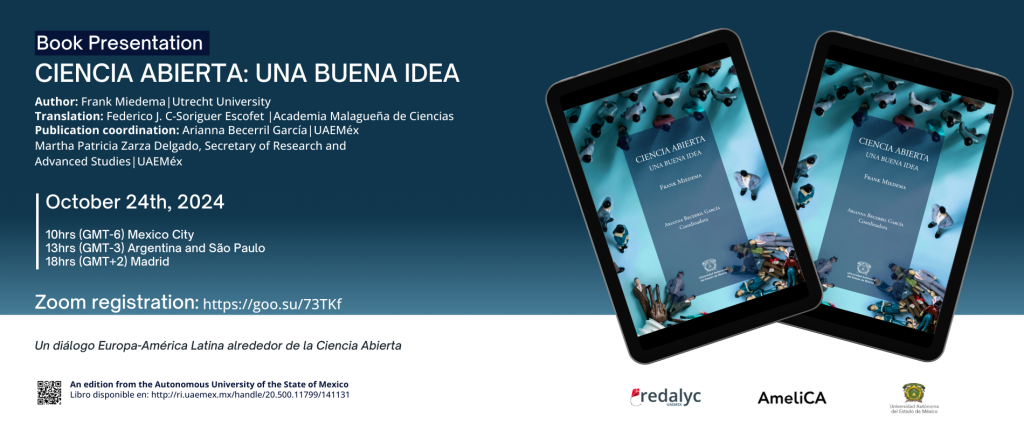Open Science: A Good Idea. Spanish Edition.

We are pleased to announce to the Diamond Open Access community and the general public the Spanish edition of the book “Open Science: A Good Idea” written by Frank Miedema. This valuable work is now available in open access thanks to the Autonomous University of the State of Mexico, through this link.
Frank Miedema, Emeritus Professor at Utrecht University, is a distinguished scientist and scholar known for his leadership in promoting open science. The translation of this book is carried out by Federico Soriguer, Coordinator of the Social Sciences and Humanities Section of the Malaga Academy of Sciences, Spain. This edition features a foreword by Arianna Becerril García, Executive Director of the Redalyc Scientific Information System and President of AmeliCA, as well as a full-time professor and researcher at the Autonomous University of the State of Mexico.
The author argues and demonstrates that Open Science is a truly and historically unique global movement in that it translates the analysis of the problems of science into major institutional actions of system change, engaging all actors in the field of science and academia, to improve academic culture and the impact of science on people’s lives wherever they live in the world.
For this the book provides a broad context for the understanding of current problems of science and of the different movements aiming to improve the societal impact of science and research. Furthermore, to provide broader and historical understanding of what Open Science entails, the book offers insights regarding ideas, old and new, about science, and their historical origins in philosophy and sociology of science. Based on a thorough analysis, as well as personal experiences in AIDS research, university administration and as a science observer, the author provides – while being totally open regarding science’s limitations- a realistic narrative about how research is conducted, and how reliable ‘objective’ knowledge is produced. The book shows that scientifically grounded knowledge is required and helpful in understanding intellectual and political positions in various discussions on the grand challenges of our time and how science makes an impact on society.
‘With Open Science we want to do a lot more towards the community and society. Open Science started bottom up, but I am happy to see that it has been widely embraced by faculty, leadership in universities, major funders in the EU and elsewhere’.
Henk Kummeling, Rector of Utrecht University.
The vision of science presented in this book, which draws heavily on American pragmatism, fits in with the current global Open Science movement. Interventions in the framework of the Open Science program, regarding Open Access, FAIR Data and Open Code, Public Engagement and the change in the Recognition and Reward system are discussed. The book reveals why these interventions, in the integral approach of Open Science to improve the research process and impact in academia and other scientific knowledge producing institutes around the globe, are often met with resistance although they seem good or even obvious.
Finally, in most recent times, Open Science is not only about research anymore, but also involves Teaching and Education. Open Education is a developing movement that has not been addressed yet in this book.
‘Open Science is about a cultural change regarding the integral vision of the relation of the university with the world. It is not only about research, but also very much about our teaching and the university as a community in the world. ‘
Manon Kluijtmans, Vice Rector Education, Utrecht University.
The author acknowledges that the Open Science movement is still much too little focused on the problems scientists have when working in the Global South and in Low- and Middle-Income Countries. These and other objections from colleagues engaged in the daily practice of science around the globe are often legitimate and constructive and must be addressed when Open Science practices are being implemented, which is currently an internationally a major ongoing program.
These discussions are essential for those interested in transforming the current scientific landscape and promoting practices that benefit the entire community. Therefore, we cordially invite you to the webinar presenting the Spanish edition of the book “Open Science: A Good Idea” on October 24th at 10 AM (GMT-6, Mexico City), 1 PM (GMT-3, Buenos Aires), and 6 PM (GMT+2, Madrid). To register, please visit this link.
